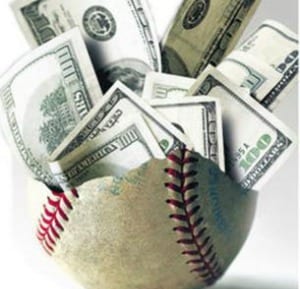Bryce Harper will enter free agency this offseason and likely sign one of the richest contracts in
baseball history. Many current contracts that will be negotiated for today’s super stars will
approach or exceed $400 million. In 1987, a total of 57 major-league baseball players earned
at least $1 million and Boston Red Sox slugger Jim Rice headed the list with an annual
salary of $2.4 million. Even if we adjust for inflation, I do not think that Jim Rice’s $2.4
million is even in the ballpark with what players of a similar or even lesser caliber are
earning today.
 I do not actively follow other professional sports franchises, so forgive me if my salary idea copies a system that is already in effect. I suggest that a way to better control the exploding salaries in MLB is through a tiered ranking system. Every player would be evaluated on a set of criteria that would rank them as a Tier 1, Tier 2 or Tier 3 player. Each tier would have a salary range, and players and owners would need to come to an agreement that a player ranked in a certain tier is limited to that salary range. However, players are eligible to receive performance driven incentives. So a team could offer a Tier 2 player certain financial incentives over and above his salary- such as X$ for exceeding 100 RBIs, or X$ for 20 wins, or 200 strikeouts- or making it into the playoffs, etc. This way, when signing a player to a long term contract, teams are not committing to the same amount of money, even when a player gets injured or his performance declines.
I do not actively follow other professional sports franchises, so forgive me if my salary idea copies a system that is already in effect. I suggest that a way to better control the exploding salaries in MLB is through a tiered ranking system. Every player would be evaluated on a set of criteria that would rank them as a Tier 1, Tier 2 or Tier 3 player. Each tier would have a salary range, and players and owners would need to come to an agreement that a player ranked in a certain tier is limited to that salary range. However, players are eligible to receive performance driven incentives. So a team could offer a Tier 2 player certain financial incentives over and above his salary- such as X$ for exceeding 100 RBIs, or X$ for 20 wins, or 200 strikeouts- or making it into the playoffs, etc. This way, when signing a player to a long term contract, teams are not committing to the same amount of money, even when a player gets injured or his performance declines.I think one of the reasons why it is so important for MLB to rein in player salaries is that the
game is pricing out its fan base. The average ticket to a Yankee game is $100. Add in the
cost for a hot dog at $4.00 and the cost of a beer at $6.00, and a family of 4 would be paying
$475.00, including parking to go to one Yankee game. Ticket prices in 1980 were $7.50.
Now, even if we adjust for inflation, the price to attend a baseball game has clearly
skyrocketed. The shame is that Baseball is the American pastime, which should be enjoyed
by people of all economic levels. It is becoming just another event afforded only by the
wealthy. According to Stats LLC, MLB Attendance drops to lowest average in 15 years, down
6.6% from this time last year and 8.6% overall. One way of putting fans back in the stands is for
MLB to demonstrate that they care about the fans. Any attempt to control salaries, and reduce the
overall costs of attending a game, will undoubtedly build good will and make it more affordable
for fans to return.
